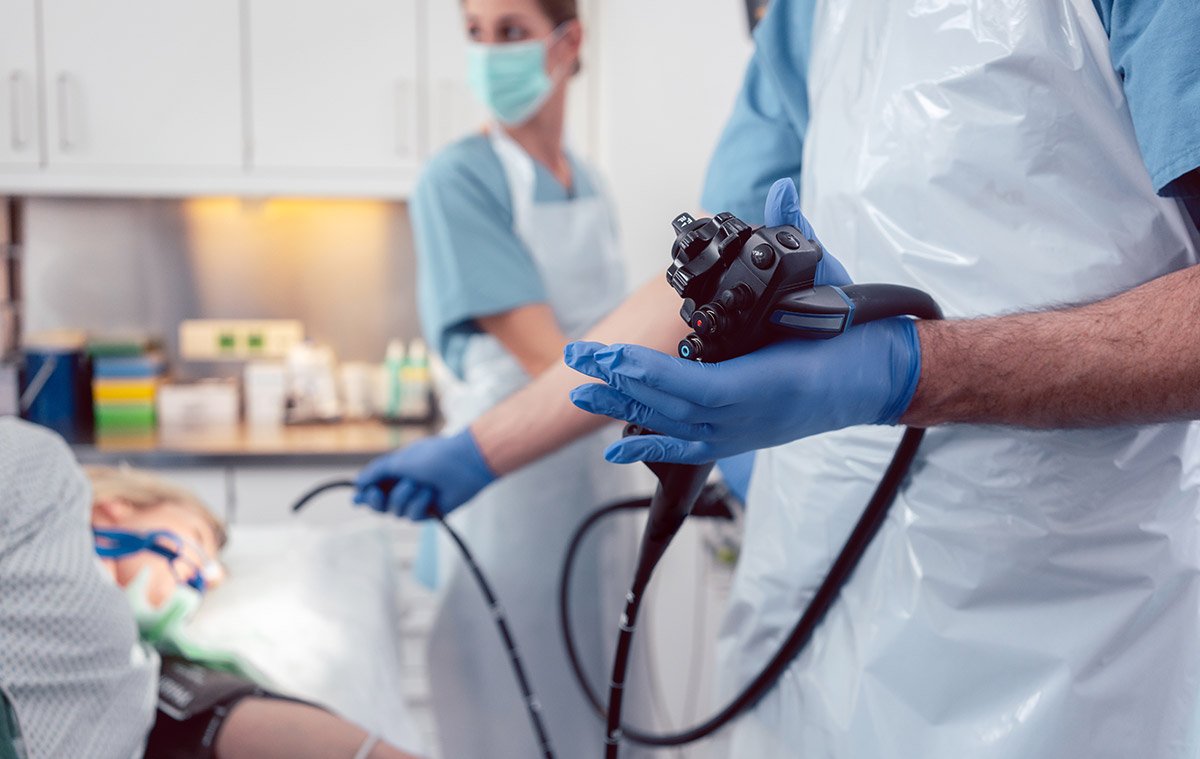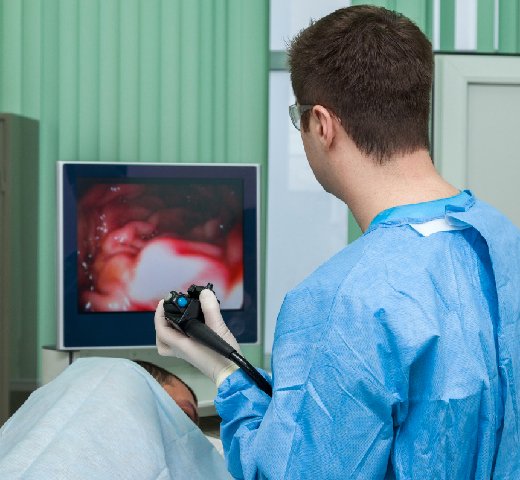Video endoscopy is a diagnostic medical procedure that uses a small, flexible tube with a light and camera at the end (an endoscope) to view the digestive tract on a video monitor. This allows doctors to inspect areas of concern within the gastrointestinal tract in real-time, helping in the diagnosis and treatment of various conditions.
Video Endoscopy

VIDEO ENDOSCOPY
Video endoscopy is a medical diagnostic technique that employs a specialized instrument called an endoscope to visually examine the interior surfaces of an organ or tissue in the body. Unlike traditional endoscopy, which might use a fiber optic camera, video endoscopy involves a tiny, high-resolution video camera at the tip of the endoscope. This camera captures detailed images or video from inside the body and transmits them to a monitor for real-time viewing by the healthcare provider.
- आहार नलिका (esophagus), आमाशय (stomach) व छोटी आंत (small intestines) की बिमारियों की जांच व उपचार।
- पेप्टिक अल्सर (peptic ulcer) की जांच करना।
- Foreign Body Extraction – भूल से निगली हुई वस्तु जैसे सिक्का, सुई, हड्डी, कीला इत्यादि निकालना।
- Endoscopic Variceal Band Ligation – रक्त की उल्टियों के उपचार हेतु फूली हुई नसों को बैंड से बांधना।
- Glue Therapy For Fundal Varices
- Variceal Sclerotherapy
- Balloon & Bougie Dilatation – आहार नलिका व पित्तनलिका की सिकुड़न को बैलून द्वारा चौड़ा करना।
- Achlasia Cardia Balloon Dilatation – एक्लेसिया कार्डिया का बैलून द्वारा उपचार।
- Percuteneous Endoscopic Gastrostomy – डायरेक्ट आमाशय में भोजन नली स्थापित करना।
- Cancer Detection – कैंसर का शुरूआती चरण में पता लगाना।
- Naso – Jejunal Feeding Tube Placement In Acute Pancreatitis – नेसो – जेजुनल ट्यूब स्थापित करना।
Dr. Sanjay K. Agrawal, a prominent Consultant Gastroenterologist based in Raipur, offers expert video endoscopy services. This advanced diagnostic procedure allows for a detailed visualization of the gastrointestinal tract, aiding in the accurate diagnosis of various conditions such as ulcers, inflammations, tumors, and more. Utilizing state-of-the-art technology, Dr. Agrawal ensures a minimally invasive experience, prioritizing patient comfort and safety. His approach combines technical proficiency with compassionate care, ensuring patients are well-informed and comfortable throughout the process. Dr. Agrawal’s expertise in video endoscopy is a cornerstone of his commitment to providing comprehensive gastroenterological care, making him a trusted choice for patients seeking specialized treatment in Raipur.
Here Are
VIDEO ENDOSCOPY F&Q's
A video endoscopy may be recommended for several reasons, including investigating symptoms such as persistent stomach pain, difficulty swallowing, gastrointestinal bleeding, and chronic heartburn. It can also be used to take biopsies, remove polyps, and treat certain conditions directly.
Preparation for a video endoscopy typically involves fasting for a certain period before the procedure, usually 6 to 12 hours, to ensure the stomach and duodenum are empty. Patients may also need to adjust their medications and follow specific instructions regarding what they can drink. In some cases, a laxative or an enema may be required, especially if the procedure involves the lower gastrointestinal tract.
During the procedure, the patient is usually sedated to ensure comfort. The endoscope is then gently inserted through the mouth (or rectum, for a lower GI tract examination) and advanced through the gastrointestinal tract. As the camera moves along, images are transmitted to a video screen, allowing the doctor to examine the tissue and the lining of the gastrointestinal tract.
Video endoscopy is generally considered safe, but as with any medical procedure, there are potential risks. These may include reactions to the sedative, bleeding from the site where a biopsy was taken or a polyp was removed, and in rare cases, perforation of the gastrointestinal tract wall.
After the procedure, patients typically spend time in a recovery area until the effects of the sedative wear off. Some may experience mild discomfort, such as bloating or sore throat, which usually resolves quickly. Most people can resume their normal diet and activities the same day, though they'll need someone to drive them home due to the sedation. Results from the endoscopy can often be discussed shortly after the procedure or at a follow-up appointment.



WhatsApp us